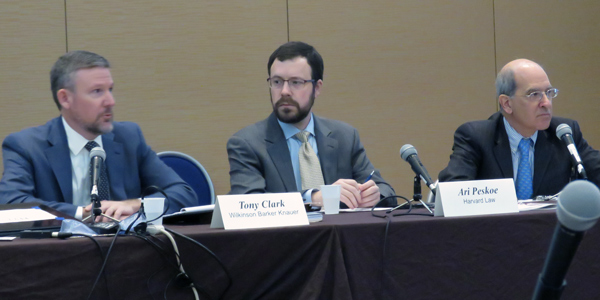By Rich Heidorn Jr.
BALTIMORE — State-federal tension over electricity policy is likely to continue even after current debates over nuclear and coal subsidies end, speakers told the National Association of Regulatory Utility Commissioners’ Annual Meeting last week.
In fact, said former FERC Commissioner Tony Clark, “things are probably going to get more tense and more difficult before they get easier.”
Clark, an adviser for Wilkinson Barker Knauer who left the commission in September 2016, said there will be pressure for additional state interventions because of the impact of renewables on energy market prices. “Increasingly we see even … relatively new gas units that are stressed in certain markets. Any resource that has higher fixed costs and variable operating costs is going to be challenged in any sort of market where you have price takers with zero variable cost units that are at the margins.”
In addition, he said, FERC may begin asserting its authority on power “from the edge of the grid,” such as rooftop solar.
“Up until this point, FERC has kind of walled that off and basically … been able to ignore what happens since that’s been on the state jurisdiction side of things,” he said.
“It’s hard to argue that all of these exponentially growing resources at the edge of the grid — in which a sale is by default a sale for resale — [is not] federally jurisdictional activity. To this point it hasn’t been that big a deal. It’s becoming a very big deal.”
Ari Peskoe, of Harvard Law School’s Environmental Policy Initiative, said legal challenges to Illinois’ and New York’s zero-emission credits for nuclear plants “expose a question that courts have not addressed in the 20 years of restructuring: May a state provide an incentive for energy production without intruding on FERC’s exclusive jurisdiction over energy sales? Perhaps the state authority over generating facilities means just that — the facilities themselves, and not the energy that they produce,” he said.
“There’s little doubt that states can enact all sorts of command-and-control regulations over pollution from those facilities. States can issue emission limits or simply prohibit the burning of fossil fuels within their borders. But what about financial regulation of pollution and avoided pollution? And what about state regulation of utility portfolios? ls there some limit on state power that limits states just to those traditional integrated resource plan tools?”
Peskoe filed an amicus brief defending the Illinois ZECs. “Expanding the scope of FERC’s exclusive jurisdiction to swallow up ZECs, [renewable energy credits] and other emissions taxes and allowances will disrupt how the industry and how regulators have understood jurisdictional limits,” he said.
If the courts accept opponents’ reading of the Federal Power Act, “we can expect lawsuits about a range of state programs,” he said, adding, “Now concerns about market distortions from ZECs seem pretty quaint in light of [the U.S. Department of Energy’s] recent Notice of Proposed Rulemaking.”
Peskoe said that if ZECs survive the current legal challenges, “existing state policy would be relatively safe from these pre-emption challenges going forward. Then the action turns back to FERC and what FERC is going to do.”
He said FERC’s May 1-2 technical conference on integrating wholesale markets and state public policies “was a really positive step … so I hope that the DOE NOPR and whatever happens after it doesn’t sort of suck the air out of the room and that conversation keeps happening.” (See RTO Markets at Crossroads, Hobbled FERC Ponders Options.)
Clark said FERC must determine when state actions reach a “tipping point” for its markets. “Whether you think the ZEC is the tipping point or the DOE NOPR is the tipping point, there is a tipping point that FERC has to be concerned about in terms of its maintenance of the integrity of the wholesale market,” he said.
“What happens when say … coal-friendly states decide, ‘It looks like RECs and ZECs are the way to go. What we need now is a coal energy credit,’” Clark asked.
“We are called the Environmental Policy Initiative, so we don’t love the idea of coal credits,” Peskoe responded. “I’m somewhat comforted by the fact that about 30 states actually enacted RPS and, so far, zero states have enacted coal standards.”
Former Commissioner Marc Spitzer (2006–2011) was more succinct: “If they’re zero-emission coal, go for it!” he joked.
Spitzer, a partner with Steptoe and Johnson, also supported ZECs, saying states are “entitled to deference and forbearance.”








